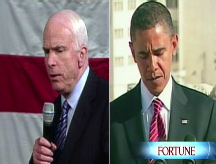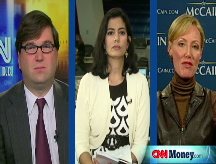McCain: Where he stands
Here are some of the Republican presidential candidate's ideas on 5 key economic issues.
NEW YORK (CNNMoney.com) -- After months of debating the issues, Americans go to the polls on Tuesday to select who they want to serve as the nation's 44th president.
The election, of course, comes at a critical moment for the U.S. economy -- and the next president will play a central role guiding it.
What follows is a sketch of Republican candidate John McCain's most important proposals for dealing with the financial crisis, housing, taxes, health care and energy. A similar article outlines the proposals of his Democratic rival, Barack Obama. (Click here.)
The next president's response to the financial and economic crisis will be guided largely by the parameters set in the massive $700 billion financial rescue package passed by lawmakers and signed into law by President Bush in October.
Both candidates voted for that bill, but each also then came out with a flurry of his own proposals to ease the growing strains felt on Main Street as a result of the crisis. McCain's are primarily tax-focused and aimed at helping cushion Americans in the short-term against the stunning drop in stocks, the anticipated rise in layoffs and troubles making ends meet.
Among the temporary measures he proposed: exempting seniors from having to make withdrawals from retirement savings; reducing the tax rate on any IRA or 401(k) withdrawals they do make; exempting jobless workers from having to pay income taxes on unemployment benefits; and increasing the amount of capital losses investors can claim on their tax return.
As the housing market unraveled over the course of the campaign, the candidates weighed in with a slew of proposals -- some of which evolved along with the mortgage crisis.
In March, McCain said, "government assistance to the banking system should be based solely on preventing systemic risk." At the time, he called on lenders to do more for borrowers.
"They've been asking the government to help them out," McCain said. "I'm now calling upon them to help their customers, and their nation out. It's time to help American families."
In October, McCain said $300 billion of the $700 billion federal financial rescue program should be used to buy loans of troubled borrowers and then write them down to affordable levels.
The McCain plan would put the full impact of any losses on the Treasury and none on the lender since the government would simply buy the loans from the lender as is, even if a borrower's mortgage debt exceeded his home's worth.
McCain has also called for reform of mortgage giants Fannie Mae and Freddie Mac -- two government-sponsored enterprises that the government effectively took over in September. Ultimately, he'd like to see them fully privatized, but in the near-term he wants stronger oversight of the agencies and has supported the government takeover.
He has also proposed creating a task force to assist state attorneys general investigating abusive lending practices and wants more transparency in the lending process.
McCain has called for lower taxes for individuals and businesses as a way to spur economic growth and create jobs.
Despite opposing them when first introduced in 2001, McCain has called for all the Bush tax cuts to be made permanent.
In addition, he has proposed increasing the exemption tax filers can claim for dependents.
McCain wants to lessen the bite of the estate tax to a greater degree than his rival and wants to provide the middle class permanent relief from the Alternative Minimum Tax.
The Republican candidate has also proposed having an alternative two-rate income tax system that Americans could choose to use instead of the current one, but the campaign never released any details on the proposal.
In terms of corporate taxes, McCain wants to lower the top corporate tax rate to 25% from 35%.
According to a nonpartisan study of McCain's tax proposals, every income group, on average, would see a tax cut. But upper-income earners would see the largest breaks under McCain.
McCain's plan for reforming health care relies heavily on individual choice and the power of the free market. It would not require anyone to have insurance, but it would change the tax incentives for getting it.
Under McCain's plan, the part of premiums employers pay on behalf of workers would be treated as taxable income to the employee -- currently they're tax-free. But in exchange, he'd offer a refundable tax credit of $2,500 ($5,000 for families) to anyone who buys health insurance, whether at work or not.
The credit would make the health insurance system less employer-centric and give everyone a tax break for getting coverage, not just those with employer plans.
McCain would also let individuals buy insurance plans across state lines to further boost competition in pricing.
He has also called for the creation of a federally subsidized state-administered program to offer coverage for low-income people.
McCain's energy plan relies on a mix of free-market means, government incentives and a lower corporate tax rate to foster renewable energy.
He favors having a cap-and-trade law to limit carbon emissions. Under McCain's plan, big energy producers would get their carbon permits for free, rather than pay the government for them. His goal: to let producers hold onto more money to invest in green technologies and reduce emissions by 2050 to a level that is 60% below where they were in 1990.
In terms of nuclear energy, McCain wants to construct 45 new reactors by 2030 to help expand nuclear power production. ![]()



